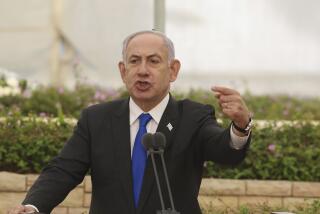Arafat’s Money Man a Focus in Tug of War
RAMALLAH, West Bank — Inside Yasser Arafat’s wrecked headquarters, the man near the top of Israel’s most wanted list is a pudgy, 62-year-old accountant.
He is Fuad Shubaki, chief financial officer of the Palestinian Authority.
A longtime colleague of Arafat and one of the Palestinian Authority president’s most trusted aides, Shubaki knows who has paid how much to whom and when and for what. He has had a hand in procuring weapons for the Palestinians for years, according to both Israeli and Palestinian sources. Israelis consider him the crucial building block in what they hope will become the definitive case to discredit Arafat.
Even as Israel’s monthlong siege of Arafat’s Ramallah compound comes to an end, it is the fate of Shubaki, a high school graduate with a near-photographic memory for numbers, that is most problematic, according to diplomats and officials.
Shubaki has been holed up inside the compound with Arafat, other aides, guards and the now-convicted killers of an Israeli Cabinet minister.
Shubaki and the killers are destined for a dusty prison in Jericho under terms of a U.S.-brokered agreement, while Israel continues to demand the extradition of all six men.
But it is Shubaki whom Israeli officials are most keen to question--and whom Arafat is most reluctant to give up.
“It’s like ‘The Untouchables,’ ” one U.S. official said. “How did they go after Capone? They went after the bookkeeper. . . . In the Palestinian world, Shubaki is that bookkeeper. That’s the role he’s playing. But the goal is not Shubaki, [it’s] Arafat.”
Whether or not he has anything to hide, Arafat can ill afford to let the Israelis get their hands on Shubaki and his knowledge of the financial operations of both the Palestinian Authority and Arafat’s Fatah movement.
Israeli intelligence officials believe that Shubaki has controlled millions, if not billions, of dollars over the years--money that was used to equip Palestinian militias, before the founding of the Palestinian Authority, and security services afterward.
Once the Palestinian Authority was established, Shubaki, as its chief financial officer, had partial control over the treasury, which was funded by aboveboard sources such as European, Saudi and Israeli contributions, plus tax revenue. More intriguing, he may have intimate knowledge of Arafat’s private and extremely well-stocked bank accounts, intelligence officials say.
They hope Shubaki can provide proof that Arafat financed terrorism. They say he may be able to supply information on payments to militant groups such as the Fatah-affiliated Al Aqsa Martyrs Brigade, which has carried out numerous shooting and suicide bombing attacks on Israelis; the structure and membership of it and similar groups; details of arms deals; and Iranian involvement in the region.
“They want him as the smoking gun to definitely link the head of the PA, and to some extent the whole structure of the PA, to the whole structure of terror,” said a second U.S. official. “Israel wants to marry the two and create a seamless link so that they can eliminate the PA.”
Israeli and Palestinian sources agree that Shubaki could do little without Arafat’s permission. Through a lawyer, he has denied wrongdoing.
Shubaki’s formal job since the establishment of the Palestinian Authority in 1994 has been to pay the salaries and buy the equipment--from guns to boots--for the three most elite and most powerful of the Palestinians’ many security branches: the Preventive Security Service, the General Intelligence Service and the Force 17 presidential guard. Israel maintains that some members of these organizations have engaged in attacks against Israelis. Palestinians do not deny that but say an entire police force cannot be blamed for the actions of a few.
Palestinian sources said Shubaki also controls the purse strings of Fatah, with oversight of all the money that goes into the organization and comes out of it. He is a partner in several businesses, including a yogurt company in the Gaza Strip, that represent investments of Fatah money, associates said.
And before the Palestinian Authority existed, he performed a similar function at Arafat’s side, disbursing the funds for Fatah-affiliated militias.
“He’s Arafat’s pocket,” said his lawyer and friend, Hussein Shyoukhi. “Not more, not less.”
Shubaki first came to general public attention after the seizure in early January of the Karine-A weapons ship. Israeli authorities intercepted the vessel in the Red Sea and said it contained 50 tons of sophisticated weaponry destined for the Palestinians.
Israeli officials at the time said they had evidence that the shipment came from Iran and was bankrolled by Shubaki. It was Shubaki’s role as the official authorizing payments, Israel argued, that established the link between the weapons and the Palestinian Authority and exposed Iranian infiltration into the Palestinian territories in a bid to stoke the flames of the intifada.
Another U.S. official confirmed that the Bush administration also believes Shubaki played a key role in the shipment.
“He seemed to have his fingerprints all over the Karine-A situation,” the official said, although he characterized Shubaki as a “middle fish” instead of a major player who could personally tie Arafat to recent terrorist attacks against Israel.
Arafat denied any connection to the weapons shipment.
When Israeli troops invaded the West Bank city of Ramallah on March 29 and stormed Arafat’s compound, they headed for the offices of Shubaki and general intelligence director Tawfiq Tirawi. Among truckloads of documents seized, Israeli intelligence officials say, were invoices signed by Shubaki issuing shoulder-fired antitank rocket launchers to the Force 17. There was also evidence of the acquisition of antiaircraft missiles, the officials said.
The Palestinian Authority is allowed to have a large quantity of small arms, but rocket launchers and antiaircraft missiles are banned according to treaties.
“He is the chief smuggler,” said Israeli army intelligence officer Col. Miri Eisen, who has been tracking Shubaki.
Palestinian officials have called into question the authenticity of all of the documents, noting the extrajudicial way in which they were taken, and accused Israel of fabricating evidence to build its case against Shubaki, the Palestinian Authority and Arafat. U.S. authorities said they have not independently confirmed the credibility of the materials.
Another document provided by Israeli intelligence officials to reporters was purported to be an invoice submitted by the Al Aqsa Martyrs Brigade to Shubaki, outlining expenses incurred by the faction for bomb-making materials, other weaponry and memorial ceremonies for its suicide bombers. The letter, dated Sept. 16, requested money for a month’s supply of about 30 bombs.
Israel offered no evidence that the money was given, and Eisen said investigators have not yet been able to establish that Shubaki made direct payments to Al Aqsa.
Shubaki holds at least two passports, according to Israeli intelligence officials. Troops who raided his office confiscated a red Palestinian Authority passport, issued in November 1998, and a red Yemeni diplomatic passport, issued in June of the same year.
In the Yemeni document, entry and exit stamps show that Shubaki traveled to Iraq in August and November of last year. Israeli sources suggest that he may have met with Iraqi arms dealers at the time.
The British press has reported that Shubaki also headed a delegation to Moscow in September 2001 to sign a $15-million deal with Iranian arms dealers. Such a trip does not appear in the two confiscated passports; he may hold yet another passport, or his passport may not have been stamped upon his entry into Russia.
Israeli intelligence officials provided the passports, along with other information, to The Times.
Within Fatah and the Palestinian middle management, Shubaki has been regarded as someone to turn to for money or other needs such as gasoline, computers and equipment, said Ahmed Nasser, a Gaza-based veteran Fatah activist who has known Shubaki since the two lived in exile in Tunisia 15 years ago.
But the bigger acquisitions always required the approval of Arafat, Nasser said.
“He’s got a very small margin to work in, without a decision from Abu Amar [Arafat],” Nasser said. “If a section wants a car or two, fine. But it’s not a very big margin.”
Shubaki was born in Gaza to an old Gazan family and followed an older brother into Arafat’s Fatah movement in the mid-1960s. He went into exile with most Fatah activists in 1967, after Israel captured the Gaza Strip. He wasn’t educated beyond high school but had enough business acumen--it is not clear that much was required--to ease into the workings of the financial administration of Arafat’s regime.
At the least, he had a good head for numbers, associates recall.
“Thousands of papers can cross his desk, and he can remember every detail, every story,” Nasser said. “Who he sends money to, where, how much. He is very careful.”
Shubaki normally wears a military uniform and holds the rank of colonel, but it is honorary and he has never been a fighter, his associates say.
“He’s not a soldier, he’s an accountant,” Shyoukhi, the lawyer, said.
As one of Arafat’s closest confidants, Shubaki was with him in Jordan in the 1970s, under siege in Beirut in 1982 and in exile in Tunisia. He followed Arafat back to Gaza by a few months, returning in 1995.
Since then, he has lived in Gaza City with his wife and five children. After the Karine-A scandal, Arafat, under enormous U.S. pressure, agreed to arrest Shubaki, ordering him into a special cell inside the Ramallah compound. Israelis did not take the arrest seriously, but it does explain why Shubaki was at the compound when the army struck.
Shubaki denies involvement with Iranian arms brokers and the Karine-A deal, Shyoukhi said. The lawyer visited Shubaki twice in jail before the Israelis took over the compound. He said Shubaki continued to profess his innocence and looked tired. Their last telephone conversation was March 27.
*
Wilkinson reported from Ramallah and Wright from Washington. Times staff writer Bob Drogin in Washington contributed to this report.
More to Read
Sign up for Essential California
The most important California stories and recommendations in your inbox every morning.
You may occasionally receive promotional content from the Los Angeles Times.











